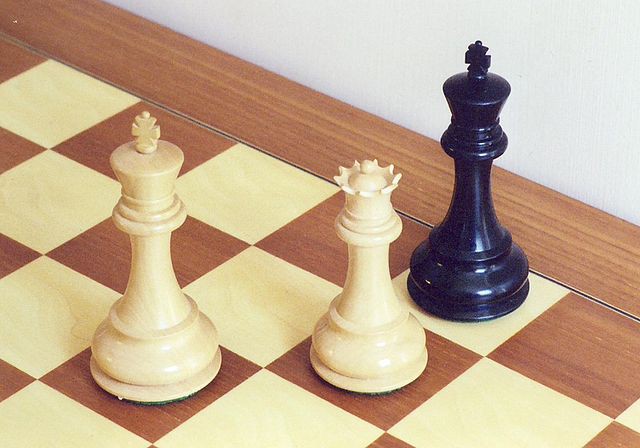
The 10 Commandments of Chess You Need to Know
According to the book of Exodus, the 10 Commandments were inscribed on two stone tablets and given to Moses on the top of Mt. Sinai -- literally, "from on high."
The 10 commandments of chess, on the other hand, were written by the experts at Chess.com (including IM Daniel Rensch), and published here on the Web for all to enjoy.
Take a look at the 10 chess commandments you need to know if you want to win, and let us know your own commandments on Facebook or in the comments section. Specifically designed for beginners, this article is meant to help you set your chess career on the right path. Enjoy!
1. Protect the King

Chess Kings by toprq.com/iphone
He's number one! While he can often fight for himself towards the end of the game, you must be aware of his safety at all times - especially as you play in the early and middle stages. Any plan you choose should address the question of whether your king will be safe enough throughout the game.
Not getting their kings to safety as quickly as possible is the biggest mistake beginners make.
2. Use All Your Pieces

You must play as a team! LeBron James, as good as he is, cannot take on a team of five NBA players by himself. Even the greatest players need to work together with their teammates.
So why do we always confuse this point in chess, using one piece at a time until we lose it? All of your pieces should work together to attack the same weakness.
Look to coordinate your pieces to attack the opposing king, or to seize control of a weak area of the board. Always play together, and leave no one behind!
3. Know the Values of Your Pieces

Cash register, Portland, Oregon by Curtis Cronn
Did you know the queen is worth 9 points? She is followed in value by the rook (5), the bishop and knight (3 each), and the pawns (1). The king is invaluable because his loss ends the game.
These point values are based on each piece’s power in the open board. You must know these values when making chess decisions. Don't give up more than you get in return.
4. Control the Center

In sports, the middle territory gets the most action, and chess is no exception. Get your pieces to the center of the board as soon as you can. There’s no better place for them to be.
Controlling the center will lead to powerful pieces, and powerful pieces have good tactics. Use your pawns to keep your opponent's pieces out of the middle.
5. Make a Plan

Planning one move at a time is never a good idea. Be aware that even a bad plan is better than no plan!
Try your best to think ahead two, three, or even four moves to create strategies and tactics that make your pieces more powerful. Planning ahead to attack an opponent's weakness is the best way to win chess games.
6. Watch for Checks and Captures

Your opponent can't checkmate you without checking you at least once, right? Always be aware of every check possible for both you and your opponent. That doesn't mean "always check because it might be mate,” but it does mean that spotting checks should be on the top of your "check list" every move.
Probably just as important as looking for checks is looking for captures. Not every possible capture will be a good one — you wouldn't normally trade a queen for a knight or bishop -- but you still MUST be aware of these captures!
7. Keep Looking

Every position has a best move. You may not always find this move, but you can find it more often with hard work and determination.
If you find a good move, look for a better one. If you find a better move, consider if it's the BEST move available.
8. Don't Play Hope Chess

Hope chess is saying to yourself: "I hope he doesn't see my threat,” or “if he goes there, I get him.” Bad idea!
Try to attack weaknesses that your opponent can't stop, instead of hoping he misses something he can easily defend. Look to make an overwhelming attack on his king, or target a weak pawn. Pawns, unlike pieces, can’t retreat in response to an attack.
If your opponent blunders along the way, so be it. But do not play hope chess!
9. Learn From the Masters

Hikaru Nakamura via Chess.com
There are lots of great chess players out there, and lots of great games to learn from.
There are several excellent chess teachers with videos on Chess.com. Learn from those who've come before you, and model your games after them.
10. Consider Your Opponent's Plan

Every principle we just talked about should be applied to your opponent's perspective on every move. Being aware of your opponent's goals against you may be even more important than your own plans.
Games are lost when you miss your opponent's threats. It's that simple!
Bonus Tip: Develop these good habits by solving quick tactical puzzles on Chess.com. They are built exclusively to teach you these critical chess skills. Also, try our lessons, which are step-by-step interactive tutorials that teach you the habits and skills you need to win more games.
What are your rules to play by? Let us know in the comments section.
Article image: The TEN COMMANDMENTS by Prayitno
GET THE MOST OUT OF CHESS.COM
- Watch GM Hikaru Nakamura play bullet in "Nakamura's Knockouts!"
- Learn how to fight a full pawn center in the Chess Mentor.
- Check out some of our fun video lectures: IM Rensch and GM Finegold are two of our most popular authors.
- Have fun and learn at the same time with the Tactics Trainer.
- Looking for articles with deeper analysis? Try our magazine: The Master's Bulletin.






